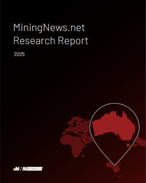Stellantis formed last year from the merger of Italian-American conglomerate Fiat Chrysler and France's PSA Group, and is said to be the fifth largest automaker in the world.
It is now set to pump A$76 million of fresh equity into Vulcan, snapping up 11.4 million shares at $6.62 each, a premium to yesterday's close of $5.75, to become the second largest shareholder in Vulcan with 8%.
The largest shareholder remains Vulcan managing director Dr Francis Wedin.
Vulcan believes the backing by Stellantis "represents the world's first upstream investment in a listed lithium company by a top tier automaker".
The cash will be used to support Vulcan's plans to expand drilling in Germany's Upper Rhine Valley brine field to support production of zero carbon lithium hydroxide.
The pair already has a relationship, having struck a lithium hydroxide offtake agreement to supply between 81,000-90,000 tonnes of production from 2026 for five years.
That agreement has just been expanded until 2035.
It is Vulcan's largest offtake deal. Other buyers include Renault, Umicore and LG Energy Systems.
Stellantis has a plan to sell only electric passenger vehicles in Europe by 2030m and is increasing its planned battery capacity by 140 gigawatt hours to some 400GWh, to be supported by five battery manufacturing plants in Europe and North America.
Wedin described Stellantis' decarbonisation and electrification goals as "some of the most ambitious in the industry".
"It is encouraging to see a leading automaker investing in local, decarbonised lithium production for electric vehicles," he said.
Stallantis CEO Carlos Tavares described the strategic investment in Vulcan as being important in creating a resilient and sustainable value chain for its battery ambitions.
Vulcan has been producing from its Zero Carbon Lithium project pilot plant at the Hochst Chemical Park in Germany for more than a year.
In recent months has commenced development of a demonstration plant to support its ambitions of becoming the world's first integrated lithium chemicals and renewable energy producer with net zero greenhouse gas emissions.
Commissioning of the direct extraction facility is expected shortly.
A definitive feasibility study is due later this year, to support targeted first commercial production in 2024.
The company commenced the quarter with about €141 million cash following significant capital raising at A$13.50 per share last September.
The stock has traded between $4.76 and $16.65 over the past year, and was up 20% this morning to $6.04, valuing it at $798 million.



